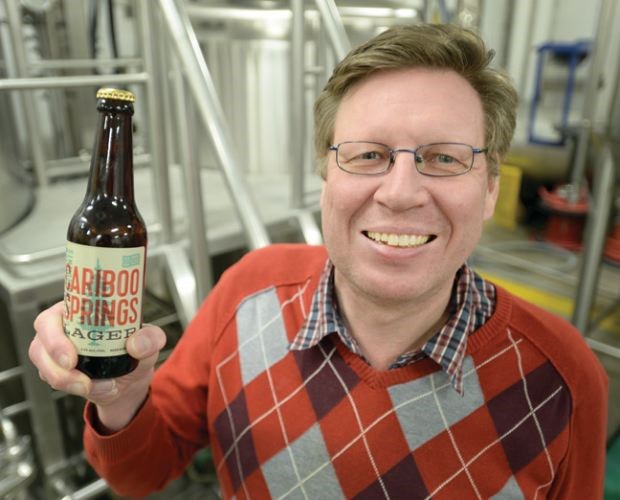It isn't easy to make an all-B.C. line of beer at a commercial level.
It wasn't easy to invent Cariboo Springs Lager, but Pacific Western Brewing of Prince George has done it.
Sure, it's the way it was always done back when beer was first crafted in British Columbia (prior to the First World War, Canada had 117 officially recognized beer-makers). It's the way personal-use brewers can still easily do it. But for the province's largest craft brewery to operate a consistent production line for a brand made exclusively of British Columbia ingredients, well that takes significant effort and organization.
"It is the VQA of beer," said PWB's longtime manager Tom Leboe, referring to the prized all-B.C. designation for provincial wines.
The hard part was obtaining the hops, a critical plant in the brewer's process.
Hops grows very well all across the province. Leboe said he used to drive past mile after mile of hops fields back in his early days in the business. But due to the corporate centralization of the beer industry throughout the final half of the 20th century, farmers here stopped growing it. The American states of Washington and Oregon became the continent's de facto hops supplier.
With recent changes in beer making laws, and a steep nationwide increase in demand for small-batch and locally produced beers, some farmers in British Columbia spotted an opportunity, and PWB spotted their own.
"We are getting the hops from Chilliwack Hop Farms," said PWB brewmaster Henrik Braun. The farm is providing them with Nugget, Mount Hood and Cascade varieties. "I think we are their biggest customer. We bought a two-year supply contract from them, to get us started with some certainty for making Cariboo Springs Lager.
"We had to be sure we'd have enough, so it was a big contract, and for us it was a big investment up front, too."
The next item on the shopping list is grain. Gambrinus Malting in Armstrong was sourced for that purpose, along with barley out of Fort St. John.
The water used in Cariboo Springs Lager comes, as for all PWB beer, from their famously high-quality on-site spring adjacent to the Nechako River.
It took several months of recipe testing to arrive at the fragrant flavour now pouring into Cariboo Springs bottles and kegs. This is not a beer that will be mistaken for mass-produced mainstream brands. It has a taste sensation all its own, with the hops sitting well forward on the palette, but that wave never gets too big. Some brands that emphasize the hops in the mix can be overwhelming.
They ramp up the bitter, but this is more like butter.
For Braun, a fifth-generation German beermaker, it was a chance to show Prince George what he can do. It was the first recipe he designed and refined since taking on the role of brewmaster at PWB. He doesn't take credit for the idea, though. The search was already on for the all-B.C. ingredients when he arrived. His job interview was exactly one year ago to the day of Cariboo Springs Lager's public release on Thursday. He has been at the Prince George factory since July.
"This idea was all Kazuko. She wanted this. She wanted to say she was making a beer made 100 per cent in B.C. and from B.C.," said Leboe, referring to company owner Kazuko Komatsu. "It wasn't possible when she came up with it. We had to wait and really work at it."
PWB has a microbrewery built into their facility. It was there that the recipe was experimented with, then, once a consensus flavour was established, it was made in the full-scale kettles.
"I like the bottles, it really tastes good, people are going to love it, I think, I hope, but it is the pubs I really hope will give it a try," said Braun.
"The keg beer doesn't have to be pasteurized. Bottled beer does, and it has an effect on the beer, no matter what beer you're talking about. That's why draught beer at the pub almost always tastes better than out of a bottle or a can. And this tastes really good from the keg. Really good."
Invited public got its first pours during an afternoon St. Patrick's Day launch party at the brewery, followed by an evening event for the general public at Westwood Pub on Thursday night.



